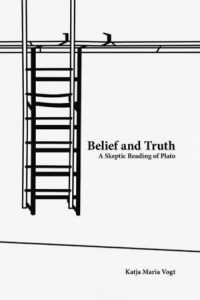Belief and Truth: A Skeptic Reading of Plato (OUP, 2012), paperback (2015), Amazon

In Belief and Truth: A Skeptic Reading of Plato, I explore a Socratic intuition about the difference between belief and knowledge. Beliefs, doxai, are deficient cognitive attitudes. In believing something, one accepts some content as true without knowing that it is true; one holds something to be true that could turn out to be false. Since our actions reflect what we hold to be true, holding beliefs is potentially harmful for oneself and others. Accordingly, beliefs are ethically worrisome and even, in the words of Plato’s Socrates, “shameful.” As I argue, this is a serious philosophical proposal. It speaks to intuitions we are likely to share, but it involves a notion of belief that is rather different from contemporary notions. Today, it is a widespread assumption that true beliefs are better than false beliefs, and that some true beliefs (perhaps those that come with justifications) qualify as knowledge. Socratic epistemology offers a genuinely different picture. In aiming for knowledge, one must aim to get rid of beliefs. Knowledge does not entail belief. Belief and knowledge differ in such important ways that they cannot both count as kinds of belief. As long as one does not have knowledge, one should reserve judgment and investigate by thinking through possible ways of seeing things.
I argue that the ancient skeptics and Stoics draw many of these ideas from Plato’s dialogues, revising Socratic-Platonic arguments as they see fit. Belief and Truth retraces their steps through interpretations of the Apology, Ion, Republic, Theaetetus, and Philebus, reconstructs Pyrrhonian investigation and thought, and illuminates the connections between ancient skepticism and relativism, as well as the Stoic view that beliefs do not even merit the evaluations “true” and “false.” The ancient skeptics, on my reading, develop versions of the Socratic idea that an unexamined life is worth nothing. Ultimately, I hope to defend the guiding intuitions of skepticism against so-called dogmatism, understood as a confident attitude of laying out how things are. A life of investigation may well be a compelling enterprise. Contrary to the presumption that it is impossible or absurd to try to do without doxa, I argue that modes of thought that are to some degree hypothetical – that involve the proviso that one is likely to encounter new arguments and evidence as time proceeds – are often called for. Indeed, this seems to me to be almost a common-sensical insight, and certainly one that is embraced by much of science today.
“This book presents some of the best and most interesting work in the history of philosophy I have encountered in quite a few years. It should have real impact both on thinking about ancient philosophy and on thinking about the options available in contemporary discussions of knowledge and belief.” Calvin Normore, UCLA
“This elegantly written book makes a significant contribution to current debates about ancient epistemology, by offering a series of radical new perspectives, both historical and philosophical. It deploys a combination of skills rare among specialists in ancient philosophy. Even at their most speculative, its findings will deserve a serious hearing.” David Sedley, University of Cambridge
“This is a stimulating book on the history of philosophy which systematically defends a single message: beliefs are deficient cognitive attitudes. […] Vogt’s book is to be recommended because it revives a long-standing skeptical tradition from Plato onwards and addresses important systematic questions. As Vogt comments at the beginning of her book, this tradition is not concerned with whether I have hands or with whether you are not a zombie (as other familiar skeptical problems have it), but concerns rather the importance of forming beliefs about such matters in the first place. This tradition, as Vogt emphasizes, can be seen as a battle against one’s own ignorance–and this is a message worth telling. This battle does not imply, indeed, that we should make more knowledge claims. It means rather that we should know which knowledge claims we are entitled to make–namely, hardly any.” Reviewed for Mind by Jan Willem Wieland, Universiteit Gent
“The primary idea, common to [Plato, Pyrrhonians, skeptical Academics, Stoics], that the book examines is that of belief (doxa) as something distinct from and inferior to knowledge—very differently from how the two are conceived in contemporary epistemology—and of belief as therefore needing to be avoided or at any rate transcended. It is a fascinating discussion. Some of the claims initially seem outrageous, and some remain open to question even after further thought. But the argument is invariably thought-provoking, and the juxtaposition of these thinkers in this particular way is strikingly original. […] this is a very exciting book.” Reviewed for Ancient Philosophy by Richard Bett, Johns Hopkins University
“[Vogt’s book] is an excellent and provocative study that offers compelling support for the notion that belief is a risky endeavour and for the sceptical inclination to opt for ‘investigative attitudes that fall short of truth-claims’ (p.190). […] The central intuition at work throughout is that belief is an inherently deficient doxastic state, one that we should strive to replace with the completely different state of knowledge. This is in marked contrast to a widely held contemporary view that knowledge is a species of belief […]” Reviewed for Polis” by Harald Thorsrud, Agnes Scott College
“Just as Vogt [seeks] to do philosophy with Plato, her book compels us to do philosophy with her. Moreover, Vogt’s challenging book has done the very hard labor of providing a Skeptic account of Plato on belief. Her work provides the much needed epistemic core for a more broadly Skeptic reading of Plato in which one sees the entire corpus as aporetic.” Reviewed for International Philosophical Quarterly by Brian Johnson, Fordham University
“This book is not so much a skeptic reading of Plato as it is a skeptic reading of Ancient Greek philosophy. The book is very ambitious both in the scope of its topic and in the breadth and depth of the arguments it offers in defense of its overarching thesis. Vogt presents Hellenistic Pyrrhonism as the culmination of epistemological stances taken by Ancient Greek philosophers from Socrates to the Hellenistic Stoics and Epicureans. […] Vogt carefully builds a case for her reading starting with the Socratic dialogues, moving on to middle and later Plato and then looking at Hellenistic philosophy. /[…] /[Her book] is provocative and certainly deserves serious study. Its greatest strength is a clear conception of the skeptical epistemology that Vogt defends throughout. According to her, knowledge and belief are two distinct kinds of cognitive attitudes. The former makes a truth claim whereas the latter makes a deficient truth claim. Having knowledge is totally independent of having beliefs, i.e., it does not follow from ‘I know that p’ that ‘I believe that p’. On the contrary, if I believe that p, I do not know that p. When a cognizer is uncertain whether she has knowledge or only belief, she should suspend judgment and continue to investigate. A corollary to this conception of belief and knowledge is that there are not two kinds of beliefs, true beliefs and false ones, but only one kind: that of being a deficient cognitive attitude. Vogt’s analysis is systematic and intricate as she defends interpretations of specific texts that become part of the mosaic of her analysis of Ancient epistemology.” Reviewed for Notre Dame Philosophical Reviews by Deborah K. W. Modrak, University of Rochester
“[Y]ou can not help but admire the lucidity with which the author addresses issues long debated by scholars. […] And not only the ancient ones: in the Introduction (p. 4), the author states as one of her objectives to show […] the relevance of skepticism to many problems discussed today. If you take the time to read the book, you’ll agree that this goal too was reached.” Reviewed for Elenchos by Mauro Bonazzi, Università degli Studi di Milano
“To what extent did Socrates influence the subsequent study of knowledge? This is the question that Vogt (Columbia Univ.) sets herself in Belief and Truth. Her answer: extensively. Vogt suggests that Socrates’s commitment to investigation animates philosophical controversy in the centuries after Plato’s death. In particular, she argues, it motivates the tradition of Pyrrhonian skepticism that survives on the spare diet of constant investigation. Her evidence for this consists of a close study of Plato’s Ion, Republic, and Theaetetus, as well as the reception of these works by Pyrrhonian and Stoic philosophers. The result is a highly accessible discussion of the history of ancient epistemology that would complement any undergraduate or graduate level course in the subject. Vogt’s treatment also includes some discussion of contemporary theories of knowledge to show the abiding significance and influence of these ancient theories on modern thought. To this reviewer’s mind, no other book on the subject focuses so ably on one issue while demonstrating the extent to which that issue has influenced subsequent history up to the present day. Summing Up: Highly recommended. Upper-division undergraduates and above.” Reviewed for Choice by Geoffrey S. Bagwell, Spokane Community College
